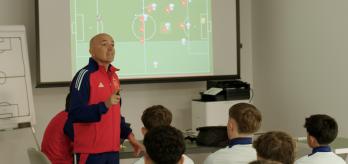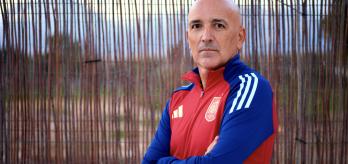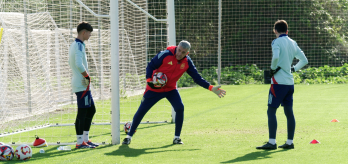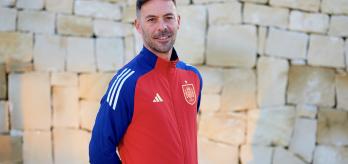Having been educated in Spain before moving to the Emirates, González, nicknamed “Beto”, discusses the importance of a coach’s adaptation to a new country, while sharing insights into his player development methods, the progress players are making in the UAE, and his team’s recent match against Mexico.
Key points
-
The key to a successful coaching transition is adaptability.
-
The UAE youth teams continue to develop intelligent players with astute decision-making.
-
Beto believes in challenging his players through self-discovery.
Watch interview
Read summary
Part 1: Adapting to the Emirates and developing talent
Beto was educated in Spain and coached for three seasons at Valencia CF’s academy before making the jump to the United Arab Emirates in 2011. In his opinion, the key to any coach’s success in a new environment is the ability to adapt quickly. In the Emirates, he realised that the climate plays a major role. He ensured his teams would rest or travel abroad in the hot summer months, and he prioritised learning Arabic to communicate more effectively with his players. He continues to enjoy life in Dubai, which he describes as increasingly international. Beto also developed a new setup aimed at scouting and capturing the best talent in the Emirates. First, he and his staff identify a pool of talented players. From that group, they create an “elite selection” of players aged 12-14 who are in line for the U-15 national team. The coaches monitor both groups closely and scout for new talents at clubs across the country. The success of this approach is evident, with more than 80% of the team’s current players coming from the “elite selection”.
Part 2: The evolution of players in the UAE
The UAE is not a footballing power yet, but Beto believes the gap between his national team and others is shrinking. Coaches in the UAE pyramid prioritise technical and tactical growth over strong physical development. The prevailing philosophy is to nurture players that know how to adapt to challenging game scenarios. Against Mexico, Beto admits that his players were nervous and struggled to implement his possession-based game model in the early part of the game. However, he continued to provide positive feedback and the tools required to help them build out from the back and gain confidence in possession. His coaching proved beneficial, and in the second half, the UAE were able to dominate possession and force Mexico to play in a defensive mid-block. Beto was very pleased with the team’s performance and aims to continue placing players in situations where they must discover new solutions.
Part 3: A coaching style built on learning
In the final portion of his interview, Beto explains that he is a coach who likes to challenge his players by placing them in situations where they must adapt and find positive solutions. To connect more with his players, he uses a mixture of Spanish, English, and Arabic, delivering feedback in the language he feels suits each individual best. While he is not afraid to pull players aside and give them immediate feedback when needed, he is flexible in his methods, giving them the time and space to discover solutions on their own. He often allows for three to five minutes of continuous play in sessions to see which solutions players come up with on their own. The head coach has high expectations and does not allow his players to relax. He demands they always learn and is constantly questioning them to see if they have understood his feedback. Most importantly, he analyses his own performance, regularly reviewing training sessions to refine his approach and give his players the best possible chance of success.



















